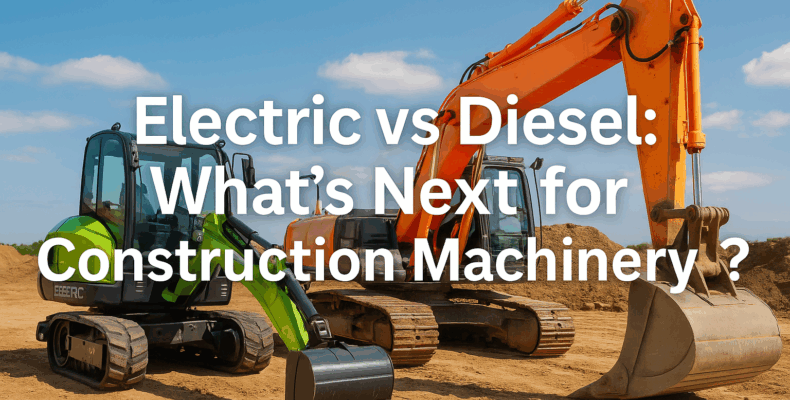As technology reshapes every industry, the construction sector is no exception. One of the most talked-about shifts today is the growing interest in electric construction machinery. While diesel-powered machines have long been the backbone of global construction, new electric alternatives are creating buzz. So, which one is better for your business in 2025 and beyond?
1. Power and Performance: Diesel Still Leads for Heavy Tasks
Diesel engines continue to dominate in terms of raw power. Large-scale projects often require extended operation hours, high torque, and consistent performance in tough terrain. Diesel equipment handles these conditions well.
However, electric machinery is catching up fast. Thanks to battery innovation, small-to-medium electric machines now deliver impressive output. For indoor use or environmentally sensitive zones, electric is often preferred.
2. Fuel Costs vs. Charging Costs
Fuel prices remain volatile in many parts of the world. On the other hand, electricity offers a more stable and cost-effective alternative in the long run. Although electric machines usually come with a higher initial price, charging costs are lower than diesel refueling.
Additionally, some countries are introducing incentives or subsidies for electric equipment, making them even more attractive for business owners.
3. Maintenance: Electric Machines Have Fewer Moving Parts
Transitioning to electric machinery may also reduce your long-term maintenance expenses. Electric engines have fewer components, which means fewer breakdowns and less downtime.
In contrast, diesel engines require frequent oil changes, filter replacements, and engine checks. This leads to more frequent service and higher labor costs.
4. Environmental Impact: Clean Machines for a Clean Future
Undoubtedly, electric machinery wins when it comes to environmental friendliness. They produce zero emissions during operation, reducing your carbon footprint and helping meet local regulations.
As construction projects increasingly focus on sustainability, having electric machines in your fleet enhances your reputation and project eligibility.
5. Battery Life and Infrastructure: Current Limitations
Despite all these advantages, electric machinery is not without challenges. Limited battery life and lack of charging infrastructure remain concerns in rural and remote job sites.
Still, many countries, especially in Africa and Southeast Asia, are making major investments in solar-powered charging and microgrid systems. In the coming years, these limitations are expected to decrease significantly.
6. Resale and Global Demand
Interestingly, diesel machines still enjoy higher global resale value, especially in developing regions. Many buyers prefer diesel due to fuel availability and familiar repair systems.
However, as more companies go green, electric resale demand is increasing, especially for used Japanese construction machinery. Japanese equipment is known for durability, making even used electric machines reliable for second owners.
7. Which One Should You Choose?
Ultimately, it depends on your business type:
| Business Type | Recommended Power Source |
|---|---|
| Urban construction projects | Electric |
| Indoor or tunnel operations | Electric |
| Remote or large-scale work | Diesel |
| Heavy equipment rental fleets | Diesel (for now) |
| Eco-conscious developers | Electric |
Trusted Exporters of Japanese Machinery
No matter which type of machine you prefer, sourcing from a reliable supplier is crucial. Japan remains a top exporter of used and reconditioned machinery. To help you make the best decision, check out the Top 5 Trusted Japanese Used Truck Exporters for Global Buyers.
These exporters offer:
-
Verified machinery with full service records
-
Competitive prices for both electric and diesel models
-
Support for global buyers including shipping and documentation
Conclusion: The Road Ahead Is Electric—But Not Entirely
In conclusion, electric construction machinery is ideal for those who want low operating costs and sustainable operation. Yet, diesel machines remain reliable for heavy-duty and remote tasks.
The smartest approach? Consider a mixed fleet that matches your short-term and long-term goals.
Stay updated, plan ahead, and choose wisely—because the future of construction is already under way.
